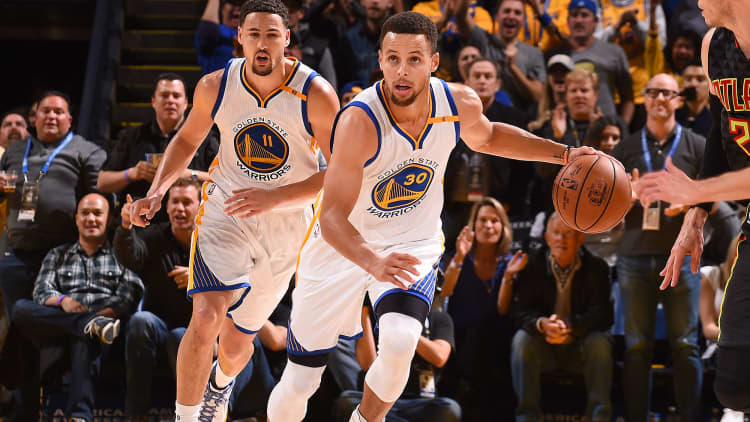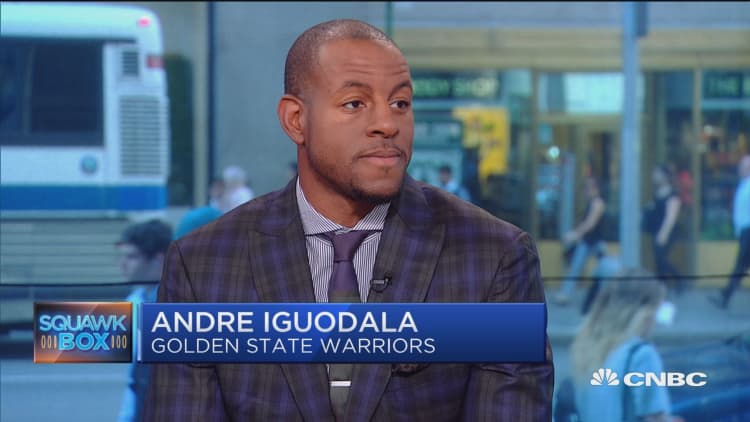
At next Sunday's NBA All-Star game in New Orleans, the first-place Golden State Warriors will make up a quarter of the Western Conference's roster, with head coach Steve Kerr running the show.
The Warriors, following a record-breaking campaign in 2015-2016, are winning a staggering 84 percent of their games this season, thanks in part to the free agent addition of four-time NBA scoring leader Kevin Durant to an already stacked starting lineup.
Life in the Bay Area is good, in sports as well as in business. And judging by how immersed the Warriors are in technology, the two are hardly disconnected.
In fact, there's a distinct symbiosis between the remarkable three-year run of the Warriors and the region's booming tech industry, which now includes three of the world's six most valuable companies— Apple, Alphabet (Google), and Facebook.
In January, the Warriors broke ground on the new Chase Center in San Francisco — right next door to the future home of ride-hailing giant Uber.
As they've turned from perennial losers to feared juggernaut, the Warriors have also become a test bed for cutting-edge technology on and off the court. Software runs throughout the organization, whether for improving shot selection, optimizing recovery from injuries or communicating with fans.
"I like to tell people I work in the world's coolest start-up," Kirk Lacob, the 28-year-old assistant general manager of the Warriors and son of majority owner Joe Lacob, told CNBC in an interview at the organization's headquarters in Oakland, California.
A direct line to Silicon Valley
The elder Lacob is a veteran venture capitalist from Kleiner Perkins Caufield & Byers. When he bought the team in the summer of 2010, he joined forces with entertainment mogul Peter Guber and formed an ownership group replete with big money techies, including YouTube co-founder Chad Hurley and venture investors Mark Stevens, Bob Kagle, and Chamath Palihapitiya.
This means the Warriors are one phone call away from any executive in Silicon Valley—and the same is mostly true in reverse.
Athos, a developer of smart apparel that contains sensors to monitor conditioning, counts Palihapitiya as a co-founder and principal investor. That relationship led to an intro to Joe Lacob, who invested himself 2014.
Thanks to these connections, Kirk Lacob began evaluating the company's technology for the Warriors at the prototyping stage, before Athos had much of anything available for trialing.
"I couldn't even let Kirk or any of the players try it," said Jake Waxenberg, director of brand strategy at Athos in Redwood City, California. "We had one pair of shorts with wires in it."
Athos is now being used for the Warriors NBA Development League team in Santa Cruz, where Kirk's younger brother Kent is general manager. Kirk said he looks to Santa Cruz as a testing ground for technologies that aren't proven out enough for the NBA team.
Second Spectrum's technology is already there.
The company's software uses cameras to collect data from every player move, shot and pass, so teams can analyze with deep granularity everything that's happening during the game.
Is Steph Curry adding too much arc to his shot? What happens when Curry and Draymond Green use the pick-and-roll against certain defenders?
The Warriors signed on for the 2014-2015 season, the year they won their first NBA title in 40 years. Stevens, a former venture capitalist from Sequoia and a member of the Warriors' ownership group, invested in the technology when the founders were coming out of the University of Southern California, where Stevens previously donated $22 million to start an innovation center.
Rajiv Maheswaran, Second Spectrum's co-founder and CEO, said that when he first went to meet the Warriors at the practice facility in Oakland to show off the technology, the whole management team seemingly showed up.
"We've had intros to lots of teams, but the Warriors are the only ones who brought everyone of significance to the first meeting," he said. "They signed us up and then won the championship. I'm sure that has everything to do with us," he joked.
Second Spectrum now works with 22 NBA teams, though the Warriors were one of the first.
Players drawn to the bright light of tech
The Warriors certainly can't attribute all — or even most — of their success to technology.
Curry was already a Warrior before the new ownership team took over, and the outperformance of Klay Thompson and Green relative to their positions in the 2011 and 2012 drafts, is more the result of talent, scouting and good luck.

But would Durant have left Oklahoma City, where he'd played since 2008, without the allure of Silicon Valley?
Athletes are all looking for lives outside of basketball. Curry started a social media platform called Slyce last year, and defensive star Andre Iguodala has invested in start-ups with names like Maven, Walker & Company and TeeSpring. Former Warriors big man Jermaine O'Neal is an investor in Athos.
When the Warriors made their pitch to Durant at the beginning of July, they used a virtual reality presentation (on a Samsung Gear VR headset) to show him a day in the life of the Warriors.
"I told him, you sign with us, any of this stuff is your playground," Kirk Lacob said. "Make your decision based on basketball and your own happiness, but understand this is a positive externality when you're here."
Durant's presence and team-leading 25.7 points a game has brought added enthusiasm and intrigue to a team that's now sold out over 200 straight home games.
Durant returns to Oklahoma City on Saturday night as the Warriors face off against the Thunder and All-Star point guard Russell Westbrook.
The fan connection
Even with fans plenty engaged, the Warriors aren't sitting still. This week, the company rolled out a partnership with a San Francisco-based start-up called Feed.fm to provide additional interviews, analysis and even music from the players' playlists.
Fans can access the service called Warriors Sound from the team's website.
"We work closely with the team to figure out what music works best around their marketing efforts," said Feed.fm founder and CEO Jeff Yasuda, who's been working in digital music for over a decade. "Music is a huge part of the culture of the NBA and the culture of the Warriors."
Zoom CEO Eric Yuan was so excited to get the Warriors to use his company's video-conferencing software, he's been willing to foot the bill.
Last year, Zoom signed a three-year deal with the Warriors, giving the team video technology to communicate with fans through online question-and-answer forums and for business meetings. In exchange for its technology and services, as well as Zoom conferencing rooms in the arena and a healthy chunk of change, Zoom gets some serious branding.
Yuan said during almost every home game, he gets a text message from a customer or two with a picture of Zoom's logo from the scoreboard, or on a digital sign somewhere in the arena. That kind of marketing helps him close deals faster, because it gives prospective customers a sudden shot of confidence, he said.
"It actually speeds up sales cycles," said Yuan, whose company just raised $100 million from Stevens' old firm Sequoia.
A virtuous cycle
The Warriors won't always be the best team in the league -- that's just the reality of sports. But right now, there's a virtuous cycle that could seemingly last a while.
A core of young, immensely talented players lures emerging tech companies who want their products in the hands of the Warriors and are willing to provide sweetheart deals to make it happen.
Add to that, an ownership group filled with techies — and immediate proximity to the world's greatest innovation hub — and you have the top free agents wanting to join the fun.
In Kirk Lacob's words: "We're trying to better stack the deck for ourselves so that we can continue to put a great product on the floor."


